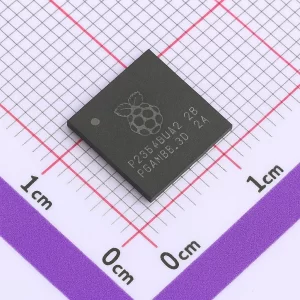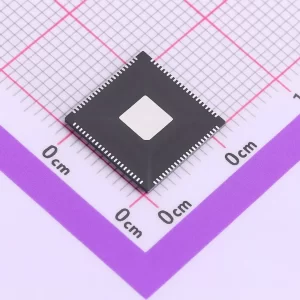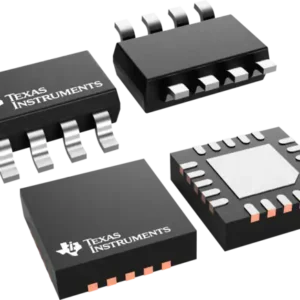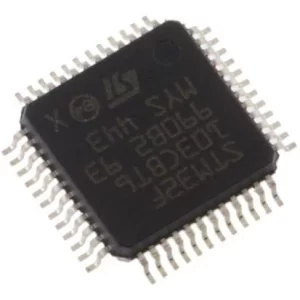MSPM0C1104SDDFR Texas Instruments MSPM0C1104SDDFR Microcontroller MCU – 24-MHz M0+, 16KB Flash, 12-bit ADC, 8-pin SOT
-
Tiny 8-pin SOT footprint with integrated 12-bit ADC.
-
Accurate 24 MHz internal oscillator; no crystal needed.
-
Multi-mode low-power design down to 200 nA shutdown.
MSPM0C1104SDDFR MCU – 24-MHz M0+, 16KB Flash, ultra-low power with 12-bit ADC in tiny 8-pin SOT package
MSPM0C1104SDDFR brings the MSPM0C110x mixed-signal capability to an ultra-compact 8-pin SOT (DDF) footprint—ideal when board area is at a premium but you still need a 24-MHz Arm® Cortex®-M0+ core, integrated 12-bit ADC, and essential serial interfaces. The family delivers up to 16KB Flash and 1KB SRAM, a high-accuracy internal 24-MHz oscillator, and multiple low-power modes down to 200 nA shutdown, enabling battery-friendly nodes and cost-sensitive sensing or control.
This orderable uses the 8-pin SOT option called out for MSPM0C110x (DDF), tailored for minimal I/O counts while preserving the same core features and ADC performance as larger packages.
Specifications
| Parameter | Value |
|---|---|
| CPU | Arm Cortex-M0+ @ up to 24 MHz (internal SYSOSC) |
| Flash / SRAM | 16KB / 1KB |
| ADC | 12-bit, up to 1.5 Msps; up to 10 ext. channels (family) |
| Internal refs | 1.4 V / 2.5 V VREF options |
| Comms | 1× UART, 1× I²C (FM+), 1× SPI (≤12 Mbps) |
| Timers | 3 timers, up to 14 PWM channels (family) |
| GPIO | Up to 18 GPIO (package dependent; 8-pin exposes fewer) |
| Supply | 1.62–3.6 V; –40 °C to +125 °C |
| Low-power | RUN ~87 µA/MHz; STANDBY ~5 µA; SHUTDOWN ~200 nA |
| Package | 8-pin SOT (DDF) orderable option for MSPM0C110x |
| Base Product Number | MSPM0C1104 |
Highlights
-
Tiny, production-friendly package: 8-pin SOT (DDF) for dense PCBs and low-cost assembly.
-
Mixed-signal on a budget: 12-bit ADC (up to 1.5 Msps family capability) with internal reference options (1.4 V / 2.5 V).
-
Right-sized performance: 24-MHz M0+ with 16KB Flash for compact firmware and fast control loops.
-
Built-in serial I/O: 1× UART, 1× I²C (Fast-mode Plus), 1× SPI (≤12 Mbps) for sensors, expanders, and radios.
-
Battery-first power profile: down to ~200 nA in shutdown for long shelf life; fast wake for event-driven nodes.
-
Scalable family: migrate to larger MSPM0C110x packages to gain I/O while preserving software investment.
What the 8-pin DDF really gives you
Designers often assume an 8-pin MCU is too constrained. With careful pin muxing, MSPM0C1104SDDFR can still:
-
Expose a few GPIOs that double as serial lines (UART/I²C/SPI) depending on your configuration.
-
Sample multiple analog inputs via the shared 12-bit ADC (actual exposed channels depend on your chosen pinout).
-
Provide PWM drive for a small motor, buzzer, or LED using on-chip timers.
Tip: start your design from the I/O budget rather than the schematic. Decide early which single serial bus unlocks the most peripherals, then map remaining pins to ADC/PWM as needed. Keep a test-pad header for reprogramming and UART logging.
Performance & power at a glance
-
Core & clock: Arm Cortex-M0+ up to 24 MHz using internal SYSOSC — no crystal needed for many use cases.
-
Memory: 16KB Flash / 1KB SRAM supports a real-time control loop, drivers, and a lightweight HAL.
-
Low-power modes: typical ~87 µA/MHz in run; ~5 µA in standby for periodic wake; ~200 nA in shutdown for shelf mode.
-
Fast wake: get to useful code execution quickly after GPIO/RTC/analog events (ideal for event-driven sensing).
Analog & peripherals
-
12-bit ADC (up to 1.5 Msps capability at the family level) with internal 1.4 V / 2.5 V references for stable measurements without an external reference.
-
Serial interfaces: UART, I²C (FM+), SPI (≤12 Mbps) cover the majority of low-power sensors and expanders.
-
Timers/PWM: 3 timers offering up to 14 PWM channels at the family level; the 8-pin package exposes a subset for drive and timing.
-
GPIO: Family supports up to 18; the 8-pin package naturally exposes fewer — enough for a bus plus one or two discretes in many designs.
-
Supervisory features: watchdog, brownout/voltage monitor (implementation varies by family member), and debug via standard TI toolchains.
Applications
-
Coin-cell battery sensors and alarms — door/window, vibration, smoke pre-processing, or tilt sensors with long standby life.
-
Tiny utility nodes — voltage, temperature, or ambient-light monitors with I²C reporting to a hub.
-
Small motor/relay drivers — PWM or simple on/off control for toys, latches, micro-pumps, or buzzers.
-
Consumable smart tags — cartridge identification, usage metering, and end-of-life indicators.
-
Personal/portable devices — wearables, clip-on beacons, or handheld accessories needing low power and minimal I/O.
-
Industrial add-ons — board-edge monitors, sensor retrofit pigtails, and SPI/I²C protocol translators.
Design tips (practical)
-
Pin budget first: choose 1 primary serial bus (often I²C) and reserve two pins for programming/UART debug during development.
-
Reference strategy: use the 2.5 V internal VREF for higher-range measurements, 1.4 V for low-voltage sensors; avoid an external reference unless absolutely necessary.
-
ADC layout: short traces, solid ground return, and a decoupled VREF pin (if exposed) help you approach the 12-bit performance.
-
Power plan: enable standby with periodic wake, and use shutdown for shipping/storage to hit the ~200 nA target.
-
Clocking: the internal oscillator is typically sufficient; only add a crystal if your protocol or timing budget demands it.
Development & software
-
Toolchains: Works smoothly with TI’s MSPM0 software support (drivers, examples) in popular IDEs.
-
Bring-up flow: start with a reference project using UART or I²C, then layer ADC sampling and PWM.
-
Production test: expose a small 3-pin test header (VCC, GND, UART/SWD) to automate firmware load and go/no-go checks.
Ordering & family context
-
Orderable: MSPM0C1104SDDFR — DDF = 8-pin SOT package option for the MSPM0C110x line.
-
Scalability: If you outgrow the 8-pin I/O count, stay in the MSPM0C110x family and move to larger packages while keeping your codebase largely intact.
Why MSPM0C1104SDDFR MCU?
If you need “just enough MCU” with credible analog and real serial I/O in the smallest, lowest-power footprint you can realistically manufacture, MSPM0C1104SDDFR hits that balance. It’s simple to design in, easy to power, and gives you a migration path within the MSPM0 family when your next rev needs more pins.
Specification: Texas Instruments MSPM0C1104SDDFR Microcontroller MCU – 24-MHz M0+, 16KB Flash, 12-bit ADC, 8-pin SOT
|







